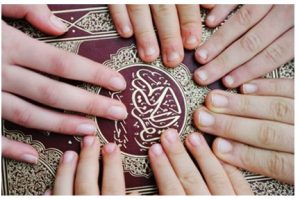Letters to the Editor
Q: I am a 19-year-old Muslim boy, medical entrance student. My parents are both doctors. Thanks to Allah(swt) that He has made us financially very sound.
I need your valuable guidance about how once can control his sexual urge. How do you think I can make my nafs fully obedient and submissive? My lack of control over my nafs leads me to some sins.
Please don’t disclose my identity.
R.,
On Email
YMD
 Happiness in life is one thing, financial success another. There are many in the world, in millions, who are financially successful, which had been the sole objective of their lives, but they are unhappy.
Happiness in life is one thing, financial success another. There are many in the world, in millions, who are financially successful, which had been the sole objective of their lives, but they are unhappy.
This happens to be the situation, spread all over the world, (and with specific reference to the Muslims) because after abandoning Islam as a source of guidance, many Muslims fell into a Shaytanic trap, first laid in the West. In the new scheme of life, happiness has been equated with material possessions. In the next step, worldly possessions have been replaced by money, shares, properties, jewelry, etc.
Finally, these things – wealth in one word – has been assumed as a synonym of happiness. That is, possession of these things, it is thought, does not bring in happiness, but rather, happiness=possessions. In other words, to have material possessions is to be happy, and, if somebody is unhappy despite possessions, then, he is mentally imbalanced.
In your case, you declare that you are a medical student, which, in a country like India, is affordable by the well-to-do alone. You also admit that financially your family is well off? But you are unhappy. Why? Because in today’s Muslim society, the family, and the home – a basic human need after full maturity – is considered no need at all, and no necessity worth taking into account. It is assumed that you are happy. Why should you not be happy when you are financially well-off? This is what today’s Muslim society, Muslim family, and Muslim homefolk cannot understand.
There is no solution to the problem unless people around you stop looking at you as a money-earning machine: like the slots of the gambling machines in USA. The family is the machine; you are one of the slots.
Your society must start looking at you as a human, first and human last: a human worthier than the degree you are working for. Your society must start loving you, and not what you are expected to earn after the completion of your studies. You must become important to them, and not what your money can buy for you in future.
If you become important, if the people around you begin to love you more than they love your degree, your ability to bring in handsome salary (after five or six years), and your ability to buy the things of this world (after 8-10 years), then, and only then, basic needs of you and your likes will be considered sympathetically.
In your case, there is no need for you to suppress your natural desires and urges. Your parents are well-off. Any one of them can support your wife without any inconvenience. But you have two earning parents.
When nature made the demand on you for sugar, your parents provided you with chocolates. Now, when nature is making a stronger  demand for a spouse, your parents – if they love you as their offspring, no matter what you are or will become – must provide you with a spouse, and not make you wait until: (a) You have a degree (a) find a good job (c) get well-settled in life, even if (d) the best days of youth are behind you, and you are close to entering into middle-age.
demand for a spouse, your parents – if they love you as their offspring, no matter what you are or will become – must provide you with a spouse, and not make you wait until: (a) You have a degree (a) find a good job (c) get well-settled in life, even if (d) the best days of youth are behind you, and you are close to entering into middle-age.
It is not enough that we look at problems without looking at the true causes, and the true solutions. If someone refuses diagnosis and medications, then, he should not complain of diseases.
Q: I had a lot of queries which, on consecutively reading YMD issues, got almost cleared. However, I have some questions. Allah’s command, “Be, and it is,” runs contrary to Allah (swt) making the earth in six days.
YMD
Firstly, Allah made the heavens and the earth in six days, and not the earth alone in six days. The earth was made in two days. Its furnishing – so to say – took four days. See the Qur’an 41: 9,10.
Secondly, you did not understand the sentence “Be, and it is,” in its right perspective. What it purports to say is: When Allah (swt) decrees a thing to be in six days, it happens in six days.
 When He intends the earth’s appearance in two days, it appears in two days.
When He intends the earth’s appearance in two days, it appears in two days.
When He intends its furnishing in four days, it happens in four days.
When He intends an infant in the womb in nine months, it takes nine months.
When He intends a thing, that it should come into existence instantaneously then He says “Kun!” and lo! It is.
Q: Again, counting of days depends upon the rotation of the earth. How could the days be counted when the earth did not exist?
YMD
Now should the wisdom of the scholars dawn upon you who have said that the allusion by “ayyaam” is to “periods” or “epochs” and not to the twenty-four hour cycle.
This is also pointed out by a Jewish scholar who said that the original word in the Bible for “days” is used in Hebrew for “epochs.” But the problem is that the Bible adds the words, “the evening and the morning,” leaving no doubt that it is the 24-hour cycle that is meant. To quote the whole passage:
“And God said, Let there be light: and there was light.
“And God saw the light, that it was good: and God divided the light from the darkness. And God called the light Day, and the darkness he called Night. And the evening and the morning were the first day.
“And God said, ‘Let there be a firmament in the midst of waters, and let it divide the waters from the waters.’ And God made the firmament, and divided the waters which were under the firmament from the waters which were above the firmament: and it was so. And God called the firmament Heaven. And the evening and the morning were the second day.”
It goes on, until the first chapter of the Bible ends with the verse:
“And God saw everything that he had made, and, behold, it was very good. And the evening and the morning were the sixth day.”
So, although the Jewish scholar points out the true meaning of the textual Hebrew word as actually referring to epochs, he, very comfortably forgets to quote the verses (leaving Bush to quote the Bible for the support of a new brand of Jews and Christians for Middle-eastern bloody adventures).
Neither the Qur’an nor its commentators have said that the six “ayyaam” of the Qur’an refer to the 24-hour, or morning and evening cycles.
Q: Are the long-time subscriptions – that you, and many other publishers, offer – permissible in Islam? When nobody knows the future, can a company guarantee continuous publication of its product?
YMD
If the allusion by you is to the subscription drive covering long periods, you are right about the uncertainty of the future, and hence subscription for life, or lengthy periods should be discouraged.
We discourage our salesmen from doing this. If they do, a clause must be added that the deed is subject to the continued appearance of the publication. It must be clearly stated that if the publication closes down, the long-term subscriber will not be entitled to refund.
Q: Despite religious denunciation, tombs are common in mosques, churches, temples, gurudwara even at some graves. Why is this so and what is their significance?
YMD
The significance is man’s refusal to bow down his head completely to God and his willingness to serve the Devil.
Q: According to Shari’ah (Islamic law) what is the proportionate share of property of a widow from in-laws who are alive? As Islam does not divest one’s right, kindly elaborate without asking me to consult Fiqh or such and such book?
YMD
Since the question is unclear, Fiqh or other books cannot also supply the answer. It is advised that you take a clear practical, meaning real, example, and supply all the surrounding details.
Q: My son (baby) was circumcised at birth but defectively. Is there need for repetition?
YMD
In matters of circumcision, only a doctor’s examination, determination, and consequent decision about repetition, can be a proper suggestion.
Q: You write ‘YmD’ rather than the name of a person by whom the questions are answered. This method suggests that the answers are worked out around a round table. Right/wrong?
Abida Thoker,
On Email
YMD
Wrong.
Q: My name is Junaid and I am a student. I want to know whether it is permitted to do the Dhikr of Allah (swt) with a loud voice. At many places, Dhikr and durood are read on loud-speakers.
Junaid,
On Email
YMD
Dhikr (or Zikr) is Allah’s remembrance. This is a religious ritual; and religious rituals must have ritual sanction. There are no directives in the Qur’an and Sunnah about how exactly to do dhikr. This is because there can be numerous situations and places, in which dhikr can be  performed. Therefore, the Prophet’s practice plays the key role. How did he perform his dhikr? We have a variety of reports concerning how he did his dhikr.
performed. Therefore, the Prophet’s practice plays the key role. How did he perform his dhikr? We have a variety of reports concerning how he did his dhikr.
His dhikr constituted in the recitation of the Qur’an, which Allah (swt) had instructed him to continuously do. Apart from the Qur’an, he did dhikr regularly after the five-daily Prayers. He recommended that his followers do the same. Accordingly, we find reports that say that the Companions remained in their positions after the termination of five daily Prayers, doing dhikr. This was done in slightly raised voice, but not jointly, that is, not in chorus and, not the same words of dhikr. Everybody had his own litany, his own words, although it cannot be ruled out that some would have said nothing, just sat silent.
Then there were joint sessions of dhikr in halaqas (circles) not specifically designed for dhikr at appointed hours, but which took shape impromptu. That is, they were not arranged. But rather, the halaqa grew from two or three engaged in conversation, and then more joining, and finally, turning into a dhikr-halaqa because, at that time, nobody lectured in the mosque for a halaqa to grow into a lecture session. Such impromptu halaqas much pleased the Prophet.
Those on the Platform (Ashab al-Suffah) also engaged themselves in dhikr, recitation of the Qur’an, and learning their religion. Sometimes the Prophet joined them as one of the participants, especially when it was a knowledge-halaqa. Yet, he never organized a halaqa himself, did not appoint an hour for it, did not appoint someone to take charge, and did not recommend anybody to form a dhikr-halaqa in such and such a manner. Nor do we know of any halaqa where dhikr-words were prescribed, and the dhikr took place in a loud voice.
Indeed, loud voice does not only disturb others, it disturbs a man’s inner self. It creates an external effect, like music, but not internal. It gives the joy of participation in a collective act, similar to joining a singing party, a Chorus in a Church, or the shouting of a football match spectators, which all help create an atmosphere, but do not touch the soul.
Doing dhikr over the loudspeaker is, perhaps, the worst way of doing it. Dhikr should be attempted by individuals, involving their inner self and souls, with as great a concentration as possible. A group’s recitation relayed over a loudspeaker has obviously those on the street, or the residents of the surrounding area, as the target. It is not dhikr. It is conveyance of a group’s collective action. It is to announce that some people are engaged in dhikr. It is an imitation of the Choruses of the Church, or similar practices of other religions. It is not Islamic.
Q: I am a regular reader of your magazine and I always find it interesting. Many a times I find answers to my questions in its Q & A column. May Allah (swt) reward you for all that you do. I have questions. Is it permissible for Muslim women to tie their hair and offer Namaz?
YMD
The rules say nothing about the condition of a woman’s hair during Prayers. It is left to her convenience, so long as she covers them fully during the Prayers.
Q: Can Muslim women earn or go for a job? If yes what type of jobs can they got into?
YMD
If the economic situation at home is such that the basic needs of a family (food, shelter, clothing, health, education) cannot be met by the earnings of the husband who tries his best, and the two see no other alternative (and not a preference from the start), then a woman may engage herself in some sort of economic activity, but reverting and abandoning as soon as the situation has improved.
This is because she is needed to bring up the children, which she cannot do if she is away from home for the whole of the day. It is on the husband to do the earning. If his eight-hour job does not earn him enough, it is nobody’s but his own problem. Let him work sixteen hours, if that is what required. He is one hundred percent responsible for providing the needs of a home, wife and children.
Q: Is it compulsory for women to cover their face i.e., wear Niqab along with the Hijab?
Ibn Mas’ud,
On email
YMD
From the point of view of what the two terms mean in practical terms, Niqab and Hijab are one and the same thing. Niqab is the word for the veil on the face. Hijab is the word for a veil or a screen between a person and others. The Qur’an said addressing the wives of the Prophet,
 “When you ask them (the Prophet’s wives) something, ask them from behind a screen.” (Al Ahzab: 53)
“When you ask them (the Prophet’s wives) something, ask them from behind a screen.” (Al Ahzab: 53)
In the above verse, the word hijab has been used in the sense of veil/screen. Now, if it was allowed to expose the face, then the screen was, perhaps, not required. This is how women other than the Prophet’s wives understood during his and later times, and used the veil to cover their faces when in public.
Yet, it may be noted that in the above verse, men have been addressed, not women. The implied meaning therefore is that the word hijab has been used not in the sense of a screen alone, (since there were other words for a screen, such as haajiz, sitr etc.), but in the sense of a behavioral attitude both on the part of women as well as men.
According to this interpretation, men observe hijab in the sense of guarding, or screening their eyes and hearts from that which they should not be looking at, because it is not theirs; therefore, even if during the exchange of things and articles, a woman’s face or body is exposed inadvertently, men should not use the opportunity to try and discover her.
Although the majority have throughout the centuries understood hijab as meaning veiling of the face with a niqab, in modern times the pressure on them is to go out and earn their own livelihood, and, sometimes, even the livelihood of their husbands and children, or, alternatively, starve … in this situation, a woman is forced to expose her face.
In case of a religiously conscious woman, this situation arises when she is not able to find a job in a place where she is not required to expose her face, or, work in women-alone environment. She finds that if she does not take up the next best job – in the sense of next best moral environment – the alternative is starvation. In such a case – and in such cases alone – if she follows the minority opinion that the face is not included in the term hijab, then, what man has the guts to say her choice is wrong, unless it is an authority who, after issuing the fatwa provides her on a regular basis, unfailingly, enough for her to meet the minimum cost of living, and expecting no words of thanks?
Q: I would like to begin by saying how much I enjoy every issue of YMD magazine. I have learnt a lot, concerning Islam, from your magazine. I find Question and Answer column most interesting. I have studied few other books and discussed Islam with few knowledgeable people. Hence, I have many questions and a few critical remarks.
I have read Shibli Nu’mani’s biography of Imam Abu-Hanifah. In the eighth chapter, he quotes Razi’s statement from the book “Manaqib-al-Shafi’i” that no book of Abu-Hanifah has survived. He writes on page 82 (English version) that Fiqh al-Akbar has been ascribed to the Imam by Fakhr al-Islam Bazdawi, Abd-al-Ali Bahr al-Ulum and other commentators. He goes on to criticize the text for not being of that period and tells us that from historical point of view, it is not established that Abu-Hanifah was the author of Fiqhal-Akbar. He concludes by saying, “I have related all the facts known to me… but my conclusion from the facts is that no work by Abu-Hanifah is extant today.” But in the cover page of the book “Fundamentals of Islamic Creed” it is stated that “al-Fiqh al-Akbar” is Abu-Hanifah’s book.
YMD
The commentary on Tahawi’s treatise by Ibn-Abi-al-‘Izz was written the eighth Hijrah century. He mentions al-Fiqh al-Akbar as Imam Abu-Hanifah’s work. Mulla Ali Qari has, in fact, written commentary on this book. So, until their time, the authenticity was not questioned.
Q: You call Imam Tahawi al-Hanafiyy and later, in the same para, Ali Ibn-Abi-al-’Izz, another Hanafiyy scholar. In some other place, you write Ashraf Ali Thanwi Hanafiyy. Why is it necessary to include “Hanafiyy” after the name, and divide these great scholars and hence their followers?
YMD
 The inclusion of Hanafiyy or Maliki or whatever, after the name of a scholar is necessary for the reader to know that when the said author states a Fiqh rule, it is following his own Madh-hab: Hanafiyy or Maliki or whatever. For, without the backing of a well-known Madh-hab, any opinion is personal opinion, acceptable to others or not, with no obligations and no censure.
The inclusion of Hanafiyy or Maliki or whatever, after the name of a scholar is necessary for the reader to know that when the said author states a Fiqh rule, it is following his own Madh-hab: Hanafiyy or Maliki or whatever. For, without the backing of a well-known Madh-hab, any opinion is personal opinion, acceptable to others or not, with no obligations and no censure.
It also helps impress upon a deviant reader, who might object to some opinions, because he holds different innovative opinions, that “Look! Here are great scholars of your own school of thought. Their views were very much, say Hanafiyy opinions, but were so different from what you hold as true.”
As regards division of the people on that basis, we don’t see any such division. The story of Muslim division on the basis of Fiqh schools is applicable only to those on the moon. On the earth, it is applicable to fanatics alone. And fanatics will separate themselves out on any ground. Others need not provide them the grounds. They will create their own.
Q: The Holy Qur’an says, “And hold fast, all together by the rope of Allah and be not divided among yourselves .”(Chapter 3: Verse 103)
YMD
 You have not understood the verse. What the verse means to say is: Do not adopt – on the national level – capitalistic or communist systems; do not adopt un-Islamic rules for your judiciary; do not set up an un-Islamic government, etc. On the individual level it means: Do not follow marriage rules as dictated by your women in contradiction to the Islamic rules; do not seek to adopt the culture of this or that people; do not abandon the Sunnah of the Prophet in favor of the ‘Sunnah’ of the West, etc.
You have not understood the verse. What the verse means to say is: Do not adopt – on the national level – capitalistic or communist systems; do not adopt un-Islamic rules for your judiciary; do not set up an un-Islamic government, etc. On the individual level it means: Do not follow marriage rules as dictated by your women in contradiction to the Islamic rules; do not seek to adopt the culture of this or that people; do not abandon the Sunnah of the Prophet in favor of the ‘Sunnah’ of the West, etc.
Can’t you see on the other hand, that when some people pronounce the Ameen loudly in Prayers, while others in sub-vocal tones, both are following the Sunnah of the Prophet? How can you apply the above verse to Fiqh differences?
Q: In another place the Qur’an says, “As for those who divide their religion and break up into sects, thou hast no part in them in the least: Their affair is with Allah: He will, in the end, tell them the truth of all that they did,” (Chapter 6: Verse 159). In this verse Allah, Glorified be He, says that one should not divide their religion into sects.
YMD
The four Madhahibs are not sects and so you are wrong in the application.
Q: But when one asks a Muslim, “Who are you?” the common answer is “I am a Hanafiyy”, “I am a Sunni”, “I am a Deobandi”, “I am a Tablighi” or “I am a Barelvi”, “I am a Shafi”, “I am a Shiah”.
YMD
Ask the Muslims you encounter in the street: Who are you? If you get an answer – sometimes from a startled person – other than that they are Muslims, then, sit down and reorient your thoughts.
Occasionally, you might get an answer, “I am an Indian,” or, “I am a Memon,” or, “I am from Kerala.” When you get that answer, then you will know the depth of corruption, the error in your opinions and the direction that your da‘wah activities should take.
Q: The Prophet (saws) is reported to have said, “My Ummah will be fragmented into seventy-three sects, and all of them will be in Hellfire except one sect.” Next the Prophet said, “It is the one to which I and my companions belong.”
YMD
We can’t blame you for not understanding the above hadith because you do not know the definition of a sect. A sect is defined as a well-defined group of people that hold as true a few major cannons of belief that are completely in contradiction to those of the Ahl al-Sunnah wa al-Jama‘ah, and treat themselves as a separate entity with a different identity. Fiqh plays no part in the above.
Note the qualifying words: well-defined group, major cannons, completely in contradiction, a separate entity and a different identity.
As for the beliefs of the Ahl al-Sunnah wa al-Jama‘ah, read the text of Tahawi to know what they are. However, not all therein is considered as the major cannons of belief.
Q: If only all Muslims read and understand Qur’an and Hadith, Insha’Allah, most of these differences would be solved and we could be one united Muslim Ummah, like before. Please comment on the above.
YMD
 Yes, if only all Muslims read and understood the Qur’an and Hadith, they would become good Muslims: if they also practiced, which is where a problem lies. Nevertheless, we do not believe all differences can be removed. For, the sources allow for differences. And those differences are not divisive factors.
Yes, if only all Muslims read and understood the Qur’an and Hadith, they would become good Muslims: if they also practiced, which is where a problem lies. Nevertheless, we do not believe all differences can be removed. For, the sources allow for differences. And those differences are not divisive factors.
Q: As an answer to a question, you have written that the majority of scholars allow the lower garments to go beyond the ankle provided it is not out of pride. Only minority opinion is that it is prohibited. How can the majority form such an opinion when all existing ahadith prohibit it? There is not a single hadith allowing that. I quote few ahadith.
YMD
It is interesting to note that after declaring Qur’an and Sunnah as the ultimate source, you have quoted two or three ahadith from Albani’s book, and, further claim that “all existing ahadith…” say something which they don’t. Should you not have rather said, “all the existing ahadith in Albani’s collection … say so and so?”
Q: Somebody had asked you if Muslims can read novels like Mills and Boons, Sidney Shieldon etc., and other romantic novels. You have answered that it is okay as long as we don’t get influenced by them. How can Muslims be allowed to read such pornographic material like Mills and Boon and expected to not get impressed by them?
YMD
Most authors first try out making money first in the clean way. When finished with creative ideas, they introduce in their works material that will sell. So, when a reader comes across a novel, which has objectionable episodes, he should hold it a little above the wastebasket, and loosen his grip.
Q: It appears that some of your answers are pro-males and anti-females.
YMD
Should not womenfolk thank us for the kindness? If they followed what we present to them of the opinions of the great scholars of Islam, will they go to higher levels of Paradise or not?
Q: For example, you allow males to trim and keep short beards.
YMD
Where is “your” hadith prohibiting it?
Q: No need to wear caps even during prayers.
YMD
Are you a dealer in caps?
Q: Can pray with lower garments below the ankle etc.
YMD
If they prayed with their lower garment hanging loose, it would be better than not Praying at all.
Q: But as far as women are concerned, you discourage them from going to mosques.
YMD
We can’t remember having discouraged women from going to mosques; nor have we encouraged them to go to the mosques. We encourage them to Pray: anywhere and everywhere.
In any case, can you recall who made the first discouraging statement in this regard?
Q: But more importantly you insist that the face is included in Hijab. Even though some great scholars like Nasir-ud-deen al-Albanee have allowed it.
YMD
The insistence is not from us. We hardly express our own views in this magazine. We quote the opinion of the Madhahib, always taking into consideration, first, the “ak-thar” (majority), then the “ahwat” (the safest) and then the “as-hal” (easiest) when differences occur within the same school.
In any case, do you think you are unfair in not quoting at this point what Albani declared as his own daughters’ practice, and what was his own preference?
Q: It is also the opinion of Yusuf al-Qardawi in his book ‘Al Halaalwa al-Haraam fi-al-Islam.’ What is your opinion about this book?
YMD
Do you think you would have quoted from that book, if it stated opinions different from what you hold as true? Indeed, do you think you would have read it at all, if your views had not been expressed there, just as you ignore any and every book that states different opinions.
Q: Others like MawlanaWahiduddin Khan also have similar opinions.
YMD
Before becoming a “Muqallid” of this or that “writer,” would you like to compare the life and contributions of those you have named throughout this letter, with the Mujtahids of the past whom you reject?
Q: I would like to add that most men have emancipated themselves from Islamic requirements of dress, and yet they expect that their womenfolk should cover themselves.
Rauoof Khan,
Bangalore
YMD
But, above, you have implied that such emancipation, as you call it, on the part of the male Muslims is wrong, to name: length of beards. You have criticized us for our own stand about it. Now, do you now want Muslim women to commit the same kind of error?
However, you seem to have made some headway in Islamic studies which the omitted part of your letter indicates. But you need to continue. We hope one day you will be able to distinguish between Shari‘ah requirements and Islamic cultural requirements.

